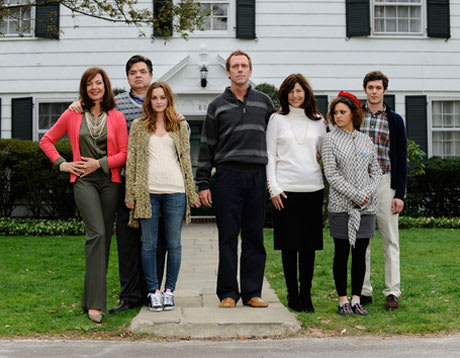Beneath the veneer of this dysfunctional family comedy is the nature of happiness as a self-serving, almost sociopathic entity, robbing the needs of others for its singular euphoria. Seeing as The Oranges is also very specifically a suburban American drama about an affluent family, best friends and neighbours, it can also be seen as a critique of the American dream and what the cost of their happiness is for the rest of the world.
To clarify, the self-serving act is that of a May-December romance between despondent husband and father David (Hugh Laurie) and best friend Terry's (Oliver Platt) daughter, Nina (Leighton Meester), when she returns home from college for Thanksgiving break. Incidentally, Nina is the same age as David's daughter, Vanessa (Alia Shawkat), a point that his wife, Paige (Catherine Keener), likes to harp on after discovering the unseemly affair.
While both Nina and David seem content in their decision – even the act of sucking on "significantly older balls," as Nina's mother, Carol (Alison Janney), points out – everyone else involved is left in turmoil, having their lives and identities ruined and forcibly uprooted by something out of their control.
Since this is essentially a film intended to make audiences laugh, the ultimate resolution is far more accessible and contrived than the subject matter suggests. There are some thoughtful performances within and the occasional inspired dialogue exchange, but more often there are manic and unlikely character reactions, such as Paige's decision to destroy a lawn covered in Christmas decorations.
The Oranges finds most of its highs in the sly one-liners the don't draw attention to themselves, like comments about Paige buying Nina a Christmas present from Baby Gap. In this sense, the comedy aspect of the film works quite well, making engaging a genre made popular, and eventually clichéd, by American Beauty.
As an incidental work that entertains more than anything else, this quirky tale of compounding conflicts and familial drama is quite effective. It's just a shame that more effort wasn't placed in mining the somewhat subversive didactics lurking beneath the surface.
(Olympus Pictures)To clarify, the self-serving act is that of a May-December romance between despondent husband and father David (Hugh Laurie) and best friend Terry's (Oliver Platt) daughter, Nina (Leighton Meester), when she returns home from college for Thanksgiving break. Incidentally, Nina is the same age as David's daughter, Vanessa (Alia Shawkat), a point that his wife, Paige (Catherine Keener), likes to harp on after discovering the unseemly affair.
While both Nina and David seem content in their decision – even the act of sucking on "significantly older balls," as Nina's mother, Carol (Alison Janney), points out – everyone else involved is left in turmoil, having their lives and identities ruined and forcibly uprooted by something out of their control.
Since this is essentially a film intended to make audiences laugh, the ultimate resolution is far more accessible and contrived than the subject matter suggests. There are some thoughtful performances within and the occasional inspired dialogue exchange, but more often there are manic and unlikely character reactions, such as Paige's decision to destroy a lawn covered in Christmas decorations.
The Oranges finds most of its highs in the sly one-liners the don't draw attention to themselves, like comments about Paige buying Nina a Christmas present from Baby Gap. In this sense, the comedy aspect of the film works quite well, making engaging a genre made popular, and eventually clichéd, by American Beauty.
As an incidental work that entertains more than anything else, this quirky tale of compounding conflicts and familial drama is quite effective. It's just a shame that more effort wasn't placed in mining the somewhat subversive didactics lurking beneath the surface.
